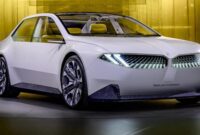The BMW Group is intensifying its efforts to shift to e-mobility and poised for further growth with the introduction of its next-generation vehicle, Neue Klasse. The company aims to achieve 50 percent of worldwide sales of fully electric vehicles by the target year of 2030.
To achieve this, BMW is investing in the expansion of its international production network, including the construction of a new high-voltage battery assembly center in San Luis Potosí, Mexico. An investment of 800 million euros (or about $866 million at current exchange rates) is expected to create around 1,000 new jobs.

15 Photo
BMW Neue Klasse vehicles will be produced in Debrecen, Hungary from 2025 and then at the main plant in Munich. Production in San Luis Potosí will start in 2027. BMW recently announced a $1.7 billion investment for the expansion of its Spartanburg production site in the US, with one billion dollars earmarked for electric vehicle production and $700 million for a new battery assembly center in Woodruff. . The company aims to build at least six fully electric models in the US by 2030.
The new battery assembly center in San Luis Potosi will cover an area of 85,000 square meters (914,932 square feet) and employ more than 500 workers, producing the next generation of batteries for fully electric vehicles. The factory, which began operations in 2019, has produced three models for 74 global markets, including the BMW 3 Series, 2 Series and M2.
The San Luis Potosi facility is highly flexible, allowing small adjustments to incorporate the new vehicle architecture and being equipped with a second shift starting in April, adding 500 new jobs to the factory workforce. BMW’s production master plan, BMW iFactory, emphasizes flexibility and efficient processes.
The Neue Klasse vehicle will be powered by a new spherical lithium-ion battery cell specially developed for the sixth generation BMW eDrive technology. These batteries will offer more than a 20 percent increase in energy density and up to a 30 percent increase in charging speed and range. CO2 emissions from cell production will be reduced by up to 60 percent due to the use of renewable energy sources and secondary materials such as lithium, cobalt and nickel.



